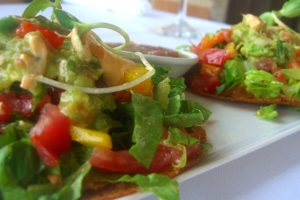
Bliss Raw Cafe & Elixir Bar's Rawko-Taco Plate, $15.
You know that episode of Sex & the City where Carrie, Miranda, Charlotte and Samantha eat at the hip new vegan restaurant “Raw”? And they wait hours to get in and the food is completely awful? And Miranda and Carrie are forced by their aggravated stomachs to get a late-night pizza to make up for the palatal abuse?
Bliss Raw Café & Elixir Bar is absolutely nothing like that.
You won’t wait hours, the food is anything but awful, and the last thing you’ll want afterwards is a greasy pizza.
The tiny brown shack of a restaurant is nestled along busy Greenville Avenue in Dallas, across the street from A 7-Express drive-through. It’s rather unassuming, and you’d probably miss it if not for the blaring, Skittles-green “BLISS” sign. The place only has two parking spaces. I swerved around to park in a facing lot, then my friends and I trudged across the intersection to be seated on the patio on a triple-digit day.
Sweating and swerving aside, my first experience at a vegan, raw foods restaurant was… well, blissful! (You’ll have to forgive me for that one, I couldn’t resist). Bliss Raw Café opened just months ago on May 1, 2009. The cozy, brick-and-wood establishment was founded by a group of ambitious raw food enthusiasts who found each other on the networking Web site www.meetup.com. The newborn raw food community found an investor and Bliss became a reality.
Bliss’s current menu boasts soups, sandwiches, pizza and noodles, even dessert, all made without meat, nuts, dairy products, sugar, gluten, or heat above 115 degrees. “Inconceivable!” you say. But Bliss does it and does it well.
Some of the café’s prices might seem a bit steep: my Rawko-Taco Plate set me back a hard-earned (ok, not so hard-earned) $15. But you’re getting your money’s worth in fresh seasonal, organic, and often local ingredients, a rare feat in today’s world of processed quick-fixes doused in preservatives. Efficiency, expedition and excess seems to be the mantra we live by, but at what expense? Bliss Raw Café is a lovely reminder that minimally and purely is sometimes the best way to live. Back to the basics, if you will.
My tacos consisted of lettuce and tomatoes piled on tortillas made of corn, red peppers, flax, onions and spices and smothered with a sun-dried-tomato-and-sunflower-seed spread. My sister ordered the Yo! Greek Rap: zucchini-tahini hummus, avocado and olives on two leaves of romaine lettuce. My friend Megha opted for the Bliss Burger, a thin, neat burger consisting of a patty sandwiched between two sheets of kamut, agave and olive oil “buns.” The patty is made from sunflower seeds, avocado, celery, “superfoods,” and tomato concentrate.
“Superfoods” are those rich in phytochemicals – chemical compounds found naturally in many plants (i.e. lycopene in tomatoes and beta-carotene, the stuff that makes carrots orange), some of which have been shown to help ward off disease.
Bliss also stocks elixirs, what our waitress described as “nutrient-dense” drinks and what Bliss’ Web site calls “powerfully nutritious and medicinal liquid potions.” Sounds so very Snow White, no? I tried a sip of Megha’s Chocolate Bliss – a concoction of a cacao superfood blend, vanilla agave, tocotrienols (part of the vitamin E family), cacao butter and orange oil – and wished I’d ordered my own.
We ended our meal with a good old-fashioned blueberry sheezcake. No, I didn’t mean to say cheesecake – this rich dessert has absolutely no cheese in it. It’s a creamy blend of cashews on a crumbly crust – you’d never guess there’s no dairy in this dessert.
The dishes at Bliss are dense and energy-packed, abounding with raw vegetables providing plenty of fiber – and thus, less is more. Your meal won’t be spilling over the sides of your china. Instead, you’ll see a tidy assembly of just the right amount of food sitting on an elegant white plate. You’ll probably think for a moment, “This just isn’t going to cut it, not today, no sir!” But then you’ll dig in and quickly realize your own capacity for gravely erroneous judgment.
“You don’t have to be a vegetarian or vegan, raw foodist, or dynamite chef to enjoy great tasting, healthy cuisine,” boasts the café’s Web site.
I happen to be a vegetarian, but like any good American, I do love my share of fried foods and processed snacks. But we’ve probably all grown up eating some homemade food: for me, it was my mom’s paneer (Indian cheese) and dahi (yogurt), and fresh crabapples and figs from our backyard. So subconsciously, we likely greatly appreciate things that don’t come from a can or a box or a bag with a manufacturer’s date on it – and that’s exactly what you get at Bliss.
Earlier this year, I saw Dr. Vandana Shiva, a leading, world-renown ecofeminist, speak at USC and she emphasized a point I’d never considered before: access to good, healthy food is a right, not a privilege.
So if you’re feeling limber, exercise your right and give Bliss Raw Café, where the message seems to be simplicity, a try. Set your skepticism aside – you’re certain to be pleasantly surprised.
Eat well and live well!
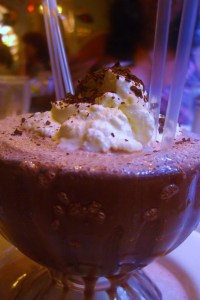
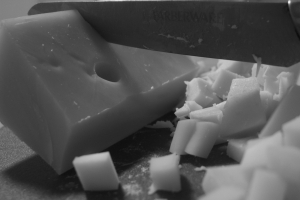
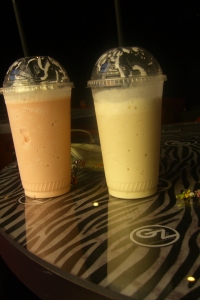
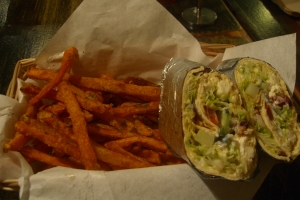
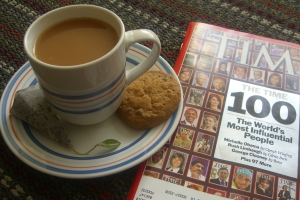
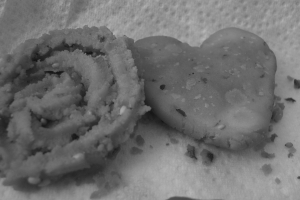
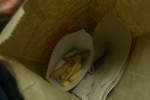 The purpose of life is food, n’est-ce pas?
The purpose of life is food, n’est-ce pas?